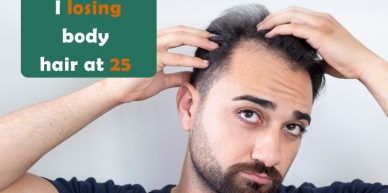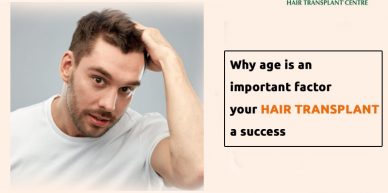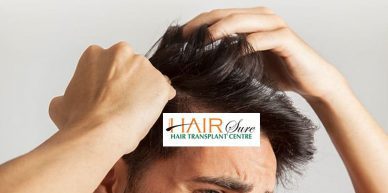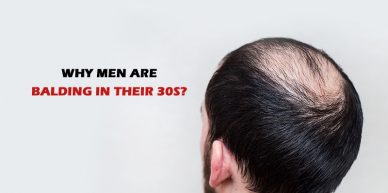Hair transplants are a cosmetic procedure for both men and women experiencing hair loss, often due to hereditary male or female pattern baldness. Hormonal changes, medical conditions, or trauma can also cause hair loss. The procedure involves taking hair follicles...
Top 5 success factors of your hair transplant at Cyber Hair Sure Hitech City

Career aspirants must constantly confront challenges. They encounter physical and physical difficulties in their professional careers, including health problems and hair loss. Some persons have hair loss due to medical disorders or medications used to treat those conditions.
For both men and women, the major goal of a hair transplant is to address hair loss or thinning hair by reestablishing natural hair growth in areas where it has been lost or noticeably diminished. Healthy hair follicles are transplanted during a hair transplant procedure from the donor portion of the body to the recipient area, which is the area that is balding or losing hair.

Hair transplant treatments are frequently carried out to treat male pattern baldness (androgenetic alopecia), the most prevalent cause of hair loss in males. A receding hairline, thinning, or loss of hair on the crown and top of the head are common symptoms of male pattern baldness. A younger-looking, fuller hairline can be restored with hair transplant surgery, and the damaged areas’ general hair density can be increased.
Women who experience hair loss, such as female pattern hair loss, hormonal hair loss, traction alopecia, and scarring alopecia, may benefit from hair transplant surgeries. Compared to men, women may experience hair loss or balding differently. Surgery for hair transplantation can help regrow hair in balding or thinning areas, increasing hair density and aesthetic appeal.
Main successful reasons for hair transplantation:
Choosing an Expert and Reliable Surgeon: The skill and experience of the surgeon doing the hair transplant are key factors in how well it goes. Do your research and pick a board-certified surgeon with experience in hair restoration. Check their credentials, previous patient outcomes, and testimonials to ensure they have a history of producing excellent results.
Thorough Preoperative Evaluation: A thorough preoperative evaluation is essential to determine whether you are a candidate for a hair transplant. The surgeon should assess your general health, the stability of your donor’s hair, and the reason for hair loss. They ought, to be honest with you about your expectations and offer you a unique treatment strategy.

Quality and Quantity of Donor Hair: Your donor hair’s quality and quantity directly affect how well the transplant goes. Make that the hair follicles in your donor location, often the back or sides of your head, are strong, lifelong, and balding-resistant. For optimum density, there must be enough supply of donor hair available.
Appropriate Surgical Technique: Follicular Unit Transplantation (FUT) and Follicular Unit Extraction (FUE) are two surgical methods that can be used for hair transplantation. Based on your unique demands, the surgeon will choose the best procedure. Both techniques are effective when used correctly, but which one you choose will depend on your hair loss pattern, the accessibility of the donor’s hair, and your personal preferences.
Postoperative Care and Maintenance: For the success of the hair transplant process, postoperative care and maintenance are crucial. Follow your surgeon’s postoperative recommendations for wound care, medication administration, and activity limitations. To encourage recovery and ideal hair growth, shield the newly transplanted hair follicles from harm, limit exposure to the sun, and maintain a healthy lifestyle.
Restoring Hairline and Hair Density: Hair transplantation is typically used to fill bald spots, boost overall hair density, or restore a receding hairline. Correcting hair loss and balding can help people restore a youthful appearance and increase self-confidence.
Results that Look Natural: Modern hair transplantation procedures like Follicular Unit Extraction (FUE) and Follicular Unit Transplantation (FUT) enable the transplanting of individual hair follicles, simulating the growth pattern of hair in its natural state. The transplanted hair can be nearly indistinguishable from natural hair thanks to skilled surgeons’ ability to produce natural results and blend in flawlessly with existing hair.
Minimal Downtime and Recovery: Compared to prior methods, hair transplantation treatments are now more sophisticated, minimally invasive, and frequently necessitate a shorter recovery period. Many value the relatively quick recovery time because it allows them to quickly return to their usual routines.
Enhanced Quality of Life: Self-esteem, self-image, and general quality of life can all suffer from hair loss. A successful hair transplant can boost social connections, boost one’s general well-being, and restore one’s sense of confidence. A person’s life might be positively impacted by feeling good about how they look.
Hair loss can be partially attributed to stress, pollution, and lifestyle choices.
Here are a few details about each of them:
Stress: While routine stress is unlikely to result in appreciable hair loss, persistent or chronic stress can exacerbate a condition known as telogen effluvium. In telogen effluvium, a temporary hair loss, more hair follicles lose after entering the resting phase (telogen). It may cause a generalized thinning of the hair. Additionally, stress may worsen or speed them up in people already inclined to certain types of hair loss, such as androgenetic alopecia (pattern baldness).
Pollutants: The health of your hair can be negatively impacted by environmental pollutants, particularly air pollution. Pollutants in the air, such as particulate matter, chemicals, and poisons, can land on the scalp and hair and cause inflammation, irritation, and damage to the hair follicles. Over time, this harm may result in hair breakage, thinning, and loss. The effects can be lessened by maintaining proper hair care and shielding the hair from pollution by covering or washing it frequently.
Factors related to lifestyle: Certain lifestyle decisions can affect hair loss. Hair thinning and loss can be caused by a poor diet, which includes a deficiency in important vitamins and minerals. The health of the hair follicles can be adversely affected by crash diets with other nutrients required for good hair growth. Additional factors that might harm the hair shaft and result in breakage and hair loss include excessive use of hairstyling products, frequent heat styling, tight hairstyles (such as braids or ponytails), and forceful hair treatments.
Remembering that hormonal and hereditary variables influence most hair loss instances significantly is crucial. Hair loss can be exacerbated or made worse by stress, pollution, and lifestyle choices, but these are frequently not the only contributing factors. It’s best to speak with a dermatologist or healthcare provider if you’re concerned about your hair health or are experiencing major hair loss so they can assess your condition properly and offer appropriate advice.
The city’s most prestigious set of clinics is cyber HairSure. The surgeons are so skilled that they provide ideal instructions for their patients before, during, after, and even during recovery. At the Hairsure clinic, we value our clients highly since we view each as unique and needing our undivided attention and care.
Depending on the degree of hair loss, the features of the natural hair, and the body’s reaction to the surgery, different people may experience different levels of success with hair transplants. Your chances of a successful outcome will rise by getting personalized advice from a skilled hair transplant surgeon.
Be aware that factors, including the patient’s particular circumstances, the surgeon’s skill, the quality of the donor’s hair, and postoperative care, might affect how well a hair transplant procedure works. By speaking with a knowledgeable practitioner, you can better grasp the potential advantages and decide if hair transplantation is the best option for you.
You can get a lot of advice to figure out the costs and find the surgeon that’s right for you. Remember, you shouldn’t skimp on costs that are influenced by the skill of the surgeon. Hiring the right surgeon can help you get the best results, even if it is more expensive. For the best treatment and affordable Hair Transplant cost in Hyderabad Madhapur, meet Cyber Hairsure Clinic at 040 49540202 / 8331020202.













